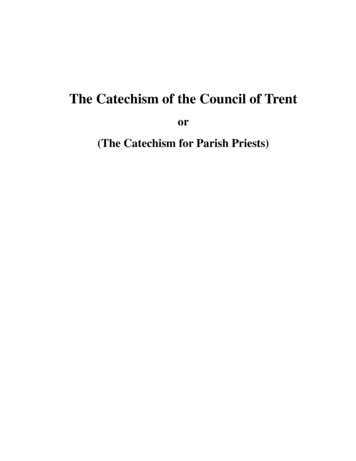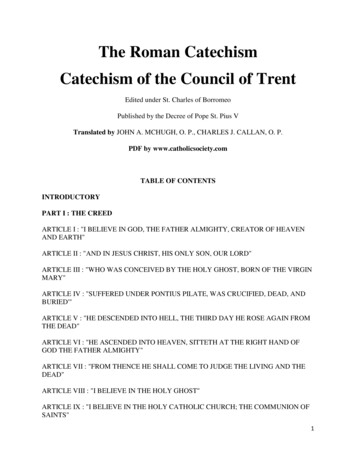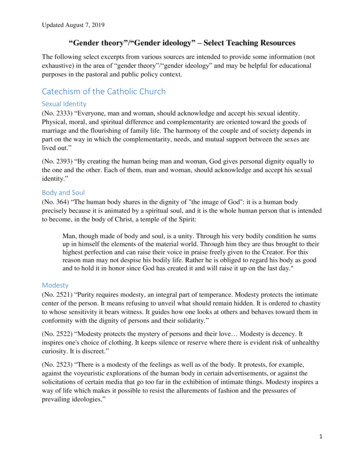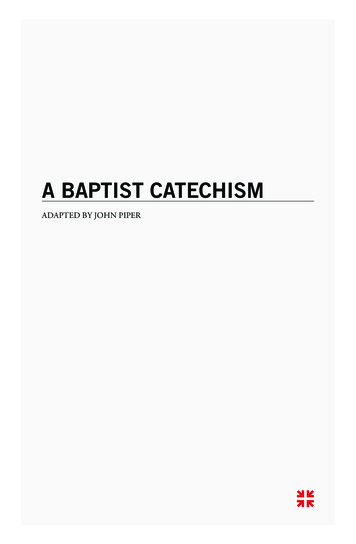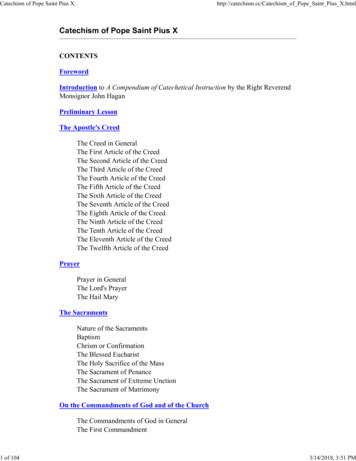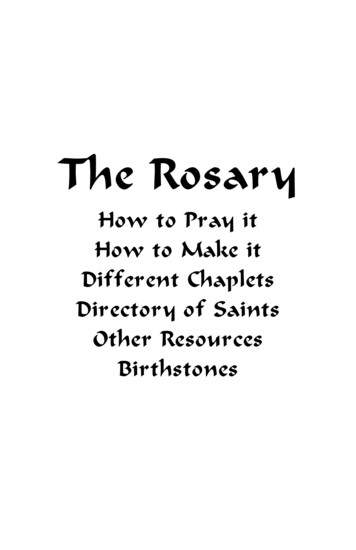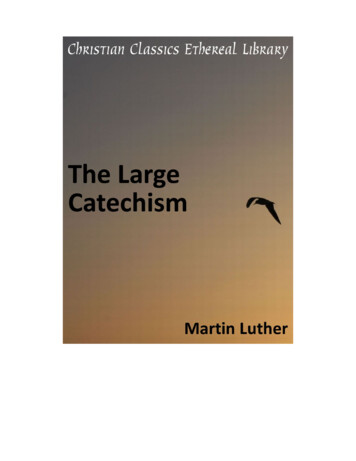
Transcription
The Large CatechismAuthor(s):Luther, Martin (1483-1546)Publisher:CCELDescription:"This sermon is designed and undertaken that it might be aninstruction for children and the simple-minded." So beginsMartin Luther's preface to his book Large Catechism. Butthis declaration should not scare away any readers, be theyold or young, because Large Catechism is a masterpiece ofdoctrine that clearly explains the basic tenets of Luther'stheology. He intended the writings to be read to children inorder that they might learn the catechism and begin tomemorize it, but the volume has become a beloved tool forteaching new Lutherans of all ages. The doctrines brokendown in the Catechism are: The Ten Commandments, TheApostles' Creed, The Lord's Prayer, the sacrament of baptism, and the sacrament of communion. Each is broken downfurther into its parts (each commandment, the articles of thecreed, etc.) and the fundamentals are explained in simplelanguage.This summation of Lutheran doctrine has survivedthe centuries, and the relatively short document is a necessityfor Lutherans and those interested in the founding father ofProtestantism.Abby ZwartCCEL Staff Writeri
ContentsThe Large Catechism1Title Page1Short Preface of Dr. Martin Luther2Part First. The Ten Commandments5The First Commandment.5The Second Commandment.11The Third Commandment.15The Fourth Commandment.19The Fifth Commandment.28The Sixth Commandment.31The Seventh Commandment.34The Eighth Commandment.38The Ninth and Tenth Commandments.43Conclusion of the Ten Commandments.46Part Second. OF THE CREED.50OF THE CREED.50Article I.51Article II.53Article III.55Part Third. OF PRAYER.60The Lord's Prayer60The First Petition.65The Second Petition.67The Third Petition.69The Fourth Petition.71The Fifth Petition.73ii
The Sixth Petition.75The Seventh and Last Petition.77Part Fourth. OF BAPTISM79Part Fifth. OF THE SACRAMENT OF THE ALTAR.84Conclusion88IndexesIndex of Scripture References9495iii
This PDF file is from the Christian Classics Ethereal Library, www.ccel.org. The mission ofthe CCEL is to make classic Christian books available to the world. This book is available in PDF, HTML, ePub, Kindle, and other formats. html. Discuss this book online at http://www.ccel.org/node/5832.The CCEL makes CDs of classic Christian literature available around the world through theWeb and through CDs. We have distributed thousands of such CDs free in developingcountries. If you are in a developing country and would like to receive a free CD, pleasesend a request by email to cd-request@ccel.org.The Christian Classics Ethereal Library is a self supporting non-profit organization atCalvin College. If you wish to give of your time or money to support the CCEL, please visithttp://www.ccel.org/give.This PDF file is copyrighted by the Christian Classics Ethereal Library. It may be freelycopied for non-commercial purposes as long as it is not modified. All other rights are reserved. Written permission is required for commercial use.iv
The Large CatechismThe Large CatechismbyMartin Luther1
Short Preface of Dr. Martin LutherThis sermon is designed and undertaken that it might be an instruction for childrenand the simple-minded. Hence of old it was called in Greek catechism, i.e., instruction forchildren, what every Christian must needs know, so that he who does not know this couldnot be numbered with the Christians nor be admitted to any Sacrament, just as a mechanicwho does not understand the rules and customs of his trade is expelled and considered incapable. Therefore we must have the young learn the parts which belong to the Catechismor instruction for children well and fluently and diligently exercise themselves in them andkeep them occupied with them.Therefore it is the duty of every father of a family to question and examine his childrenand servants at least once a week and to ascertain what they know of it, or are learning and,if they do not know it, to keep them faithfully at it. For I well remember the time, indeed,even now it is a daily occurrence that one finds rude, old persons who knew nothing andstill know nothing of these things, and who, nevertheless, go to Baptism and the Lord'sSupper, and use everything belonging to Christians, notwithstanding that those who cometo the Lord's Supper ought to know more and have a fuller understanding of all Christiandoctrine than children and new scholars. However, for the common people we are satisfiedwith the three parts, which have remained in Christendom from of old, though little of ithas been taught and treated correctly until both young and old who are called and wish tobe Christians, are well trained in them and familiar with them. These are the following:First.THE TEN COMMANDMENTS OF GOD.1. Thou shalt have no other gods before Me.2. Thou shalt not take the name of the Lord, thy God, in vain [for the Lord willnot hold him guiltless that taketh His name in vain].3. Thou shalt sanctify the holy-day. [Remember the Sabbath-day to keep itholy.]4. Thou shalt honor thy father and mother [that thou mayest live long uponthe earth].5. Thou shalt not kill.6. Thou shalt not commit adultery.7. Thou shalt not steal.8. Thou shalt not bear false witness against thy neighbor.9. Thou shalt not covet thy neighbor's house.10. Thou shalt not covet thy neighbor's wife, nor his man-servant, nor hismaidservant, nor his cattle [ox, nor his ass], nor anything that is his.Secondly.THE CHIEF ARTICLES OF OUR FAITH.1. I believe in God the Father Almighty, Maker of heaven and earth.2
Short Preface of Dr. Martin Luther2. And in Jesus Christ, His only Son, our Lord; who was conceived by the HolyGhost, born of the Virgin Mary; suffered under Pontius Pilate, was crucified, dead and buried; He descended into hell; the third day He rose againfrom the dead; He ascended into heaven, and sitteth on the right hand ofGod the Father Almighty; from thence He shall come to judge the quickand the dead.3. I believe in the Holy Ghost, the holy Christian Church, the communion ofsaints, the forgiveness of sins, the resurrection of the body, and the lifeeverlasting. Amen.Thirdly.THE PRAYER, OR "OUR FATHER," WHICH CHRIST TAUGHTOur Father who art in heaven.1. Hallowed be Thy name.2. Thy kingdom come.3. Thy will be done on earth as it is in heaven.4. Give us this day our daily bread.5. And forgive us our trespasses as we forgive those who trespass against us.6. And lead us not into temptation.7. But deliver us from evil. [For Thine is the kingdom and the power and theglory, forever and ever.] Amen.These are the most necessary parts which one should first learn to repeat word for wordand which our children should be accustomed to recite daily when they arise in the morning,when they sit down to their meals, and when they retire at night; and until they repeat them,they should be given neither food nor drink. Likewise every head of a household is obligedto do the same with respect to his domestics, man-servants and maid-servants and not tokeep them in his house if they do not know these things and are unwilling to learn them.For a person who is so rude and unruly as to be unwilling to learn these things is not to betolerated, for in these three parts everything that we have in the Scriptures is comprehendedin short, plain, and simple terms. For the holy Fathers or apostles (whoever they were) havethus embraced in a summary the doctrine, life, wisdom, and art of Christians, of which theyspeak and treat, and with which they are occupied.Now, when these three arts are apprehended, it behooves a person also to know whatto say concerning our Sacraments, which Christ Himself instituted, Baptism and the holybody and blood of Christ, namely, the text which Matthew [28, 19 ff.] and Mark [16, 15 f.]record at the close of their Gospels when Christ said farewell to His disciples and sent themforth.OF BAPTISM.3
Short Preface of Dr. Martin LutherGo ye and teach all nations, baptizing them in the name of the Father, and of the Son,and of the Holy Ghost. He that believeth and is baptized shall be saved; but he that believethnot shall be damned.So much is sufficient for a simple person to know from the Scriptures concerning Baptism. In like manner, also, concerning the other Sacrament in short, simple words, namelythe text of St. Paul [1 Cor. 11, 23 f.].OF THE SACRAMENTOur Lord Jesus Christ, the same night in which He was betrayed, took bread; and whenHe had given thanks, He brake it, and gave it to His disciples and said, Take, eat; this is Mybody, which is given for you: this do in remembrance of Me.After the same manner also He took the cup, when He had supped, gave thanks, andgave it to them, saying, Drink ye all of it; this cup is the new testament in My blood, whichis shed for you for the remission of sins: this do ye, as oft as ye drink it, in remembrance ofMe.Thus, ye would have, in all, five parts of the entire Christian doctrine which should beconstantly treated and required [of children] and heard recited word for word. For you mustnot rely upon it that the young people will learn and retain these things from the sermonalone. When these parts have been well learned, you may, as a supplement and to fortifythem. lay before them also some psalms or hymns, which have been composed on theseparts, and thus lead the young into the Scriptures, and make daily progress therein.However, it is not enough for them to comprehend and recite these parts according tothe words only, but the young people should also be made to attend the preaching, espeiallyduring the time which is devoted to the Catechism, that they may hear it explained and maylearn to understand what every part contains, so as to be able to recite it as they have heardit, and, when asked, may give a correct answer, so that the preaching may not be withoutprofit and fruit. For the reason why we exercise such diligence in preaching the Catechismso often is that it may be inculcated on our youth, not in a high and subtile manner, butbriefly and with the greatest simplicity, so as to enter the mind readily and be fixed in thememory.Therefore we shall now take up the abovementioned articles one by one and in theplainest manner possible say about them as much as is necessary.4
Part First. The Ten CommandmentsThou shalt have no other gods before Me.That is: Thou shalt have [and worship] Me alone as thy God. What is the force of this,and how is it to be understood? What does it mean to have a god? or, what is God? Answer:A god means that from which we are to expect all good and to which we are to take refugein all distress, so that to have a God is nothing else than to trust and believe Him from the[whole] heart; as I have often said that the confidence and faith of the heart alone make bothGod and an idol. If your faith and trust be right, then is your god also true; and, on theother hand, if your trust be false and wrong, then you have not the true God; for these twobelong together faith and God. That now, I say, upon which you set your heart and put yourtrust is properly your god.Therefore it is the intent of this commandment to require true faith and trust of theheart which settles upon the only true God and clings to Him alone. That is as much as tosay: "See to it that you let Me alone be your God, and never seek another," i.e.: Whateveryou lack of good things, expect it of Me, and look to Me for it, and whenever you suffermisfortune and distress, creep and cling to Me. I, yes, I, will give you enough and help youout of every need; only let not your heart cleave to or rest in any other.This I must unfold somewhat more plainly, that it may be understood and perceivedby ordinary examples of the contrary. Many a one thinks that he has God and everythingin abundance when he has money and possessions; he trusts in them and boasts of themwith such firmness and assurance as to care for no one. Lo, such a man also has a god,Mammon by name, i.e., money and possessions, on which he sets all his heart, and whichis also the most common idol on earth. He who has money and possessions feels secure,and is joyful and undismayed as though he were sitting in the midst of Paradise. On theother hand, he who has none doubts and is despondent, as though he knew of no God. Forvery few are to be found who are of good cheer, and who neither mourn nor complain ifthey have not Mammon. This [care and desire for money] sticks and clings to our nature,even to the grave.So, too, whoever trusts and boasts that he possesses great skill, prudence, power, favor,friendship, and honor has also a god, but not this true and only God. This appears againwhen you notice how presumptuous, secure, and proud people are because of such possessions, and how despondent when they no longer exist or are withdrawn. Therefore I repeatthat the chief explanation of this point is that to have a god is to have something in whichthe heart entirely trusts.Besides, consider what in our blindness, we have hitherto been practising and doingunder the Papacy. If any one had toothache, he fasted and honored St. Apollonia [[aceratedhis flesh by voluntary fasting to the honor of St. Apollonia]; if he was afraid of fire, he choseSt. Lawrence as his helper in need; if he dreaded pestilence, he made a vow to St. Sebastianor Rochio, and a countless number of such abominations, where every one selected his own5
The First Commandment.saint, worshiped him, and called for help to him in distress. Here belong those also, as, e.g.,sorcerers and magicians, whose idolatry is most gross, and who make a covenant with thedevil, in order that he may give them plenty of money or help them in love-affairs, preservetheir cattle, restore to them lost possessions, etc. For all these place their heart and trustelsewhere than in the true God, look for nothing good to Him nor seek it from Him.Thus you can easily understand what and how much this commandment requires,namely, that man's entire heart and all his confidence be placed in God alone, and in noone else. For to have God, you can easily perceive, is not to lay hold of Him with our handsor to put Him in a bag [as money], or to lock Him in a chest [as silver vessels]. But to apprehend Him means when the heart lays hold of Him and clings to Him. But to cling to Himwith the heart is nothing else than to trust in Him entirely. For this reason He wishes toturn us away from everything else that exists outside of Him, and to draw us to Himself,namely, because He is the only eternal good. As though He would say: Whatever you haveheretofore sought of the saints, or for whatever [things] you have trusted in Mammon oranything else, expect it all of Me, and regard Me as the one who will help you and pour outupon you richly all good things.Lo, here you have the meaning of the true honor and worship of God, which pleasesGod, and which He commands under penalty of eternal wrath, namely, that the heart knowno other comfort or confidence than in Him, and do not suffer itself to be torn from Him,but, for Him, risk and disregard everything upon earth. On the other hand, you can easilysee and judge how the world practises only false worship and idolatry. For no people hasever been so reprobate as not to institute and observe some divine worship; every one hasset up as his special god whatever he looked to for blessings, help, and comfort.Thus, for example, the heathen who put their trust in power and dominion elevatedJupiter as the supreme god; the others, who were bent upon riches, happiness, or pleasure,and a life of ease, Hercules, Mercury, Venus or others; women with child, Diana or Lucina,and so on; thus every one made that his god to which his heart was inclined, so that evenin the mind of the heathen to have a god means to trust and believe. But their error is thisthat their trust is false and wrong for it is not placed in the only God, besides whom thereis truly no God in heaven or upon earth. Therefore the heathen really make their self-inventednotions and dreams of God an idol, and put their trust in that which is altogether nothing.Thus it is with all idolatry; for it consists not merely in erecting an image and worshipingit, but rather in the heart, which stands gaping at something else, and seeks help and consolation from creatures, saints, or devils, and neither cares for God, nor looks to Him for somuch good as to believe that He is willing to help, neither believes that whatever good itexperiences comes from God.Besides, there is also a false worship and extreme idolatry, which we have hithertopractised, and is still prevalent in the world, upon which also all ecclesiastical orders are6
The First Commandment.founded, and which concerns the conscience alone that seeks in its own works help, consolation, and salvation, presumes to wrest heaven from God, and reckons how many bequestsit has made, how often it has fasted, celebrated Mass, etc. Upon such things it depends, andof them boasts, as though unwilling to receive anything from God as a gift, but desires itselfto earn or merit it superabundantly, just as though He must serve us and were our debtor,and we His liege lords. What is this but reducing God to an idol, yea, [a fig image or] anapple-god, and elevating and regarding ourselves as God ? But this is slightly too subtile,and is not for young pupils.But let this be said to the simple, that they may well note and remember the meaningof this commandment, namely, that we are to trust in God alone, and look to Him and expectfrom Him naught but good, as from one who gives us body, life, food, drink, nourishment,health, protection, peace, and all necessaries of both temporal and eternal things. He alsopreserves us from misfortune, and if any evil befall us, delivers and rescues us, so that it isGod alone (as has been sufficiently said) from whom we receive all good, and by whom weare delivered from all evil. Hence also, I think, we Germans from ancient times call God(more elegantly and appropriately than any other language) by that name from the wordgood as being an eternal fountain which gushes forth abundantly nothing but what is good,and from which flows forth all that is and is called good.For even though otherwise we experience much good from men, still whatever we receiveby His command or arrangement is all received from God. For our parents, and all rulers,and every one besides with respect to his neighbor, have received from God the commandthat they should do us all manner of good, so that we receive these blessings not from them,but, through them, from God. For creatures are only the hands, channels, and means wherebyGod gives all things, as He gives to the mother breasts and milk to offer to her child, andcorn and all manner of produce from the earth for nourishment, none of which blessingscould be produced by any creature of itself.Therefore no man should presume to take or give anything except as God has commanded, in order that it may be acknowledged as God's gift, and thanks may be renderedHim for it, as this commandment requires. On this account also these means of receivinggood gifts through creatures are not to be rejected, neither should we in presumption seekother ways and means than God has commanded. For that would not be receiving fromGod, hut seeking of ourselves.Let every one, then, see to it that he esteem this commandment great and high aboveall things, and do not regard it as a joke. Ask and examine your heart diligently, and youwill find whether it cleaves to God alone or not. If you have a heart that can expect of Himnothing but what is good, especially in want and distress, and that, moreover renouncesand forsakes everything that is not God, then you have the only true God. If on the contrary,7
The First Commandment.it cleaves to anything else, of which it expects more good and help than of God, and doesnot take refuge in Him, but in adversity flees from Him, then you have an idol, another god.In order that it may be seen that God will not have this commandment thrown to thewinds, but will most strictly enforce it, He has attached to it first a terrible threat, and thena beautiful, comforting promise which is also to be urged and impressed upon young people,that they may take it to heart and retain it:[Exposition of the Appendix to the First Commandment.]For I am the Lord, thy God, strong and jealous, visiting the iniquity of the fathers uponthe children unto the third and fourth generation of them that hate Me; and showing mercyunto thousands of them that love Me and keep My commandments.Although these words relate to all the commandments (as we shall hereafter learn), yetthey are joined to this chief commandment because it is of first importance that men havea right head; for where the head is right, the whole life must be right, and vice versa. Learn,therefore, from these words how angry God is with those who trust in anything but Him,and again, how good and gracious He is to those who trust and believe in Him alone withthe whole heart; so that His anger does not cease until the fourth generation, while, on theother hand, His blessing and goodness extend to many thousands lest you live in such securityand commit yourself to chance, as men of brutal heart, who think that it makes no greatdifference [how they live]. He is a God who will not leave it unavenged if men turn fromHim, and will not cease to be angry until the fourth generation, even until they are utterlyexterminated. Therefore He is to be feared, and not to be desisted.He has also demonstrated this in all history, as the Scriptures abundantly show anddaily experience still teaches. For from the beginning He has utterly extirpated all idolatry,and, on account of it, both heathen and Jews; even as at the present day He overthrows allfalse worship, so that all who remain therein must finally perish. Therefore, although proud,powerful, and rich worldlings [Sardanapaluses and Phalarides, who surpass even the Persiansin wealth] are now to be found, who boast defiantly of their Mammon, with utter disregardwhether God is angry at or smiles on them, and dare to withstand His wrath, yet they shallnot succeed, but before they are aware, they shall be wrecked, with all in which they trusted;as all others have perished who have thought themselves more secure or powerful.And just because of such hardened heads who imagine because God connives and allowsthem to rest in security, that He either is entirely ignorant or cares nothing about suchmatters, He must deal a smashing blow and punish them, so that He cannot forget it untochildren's children; so that every one may take note and see that this is no joke to Him. Forthey are those whom He means when He says: Who hate Me, i.e., those who persist in theirdefiance and pride; whatever is preached or said to them, they will not listen; when they arereproved, in order that they may learn to know themselves and amend before the punishment8
The First Commandment.begins, they become mad and foolish so as to fairly merit wrath, as now we see daily inbishops and princes.But terrible as are these threatenings, so much the more powerful is the consolation inthe promise, that those who cling to God alone should be sure that He will show them mercythat is, show them pure goodness and blessing not only for themselves, but also to theirchildren and children's children, even to the thousandth generation and beyond that. Thisought certainly to move and impel us to risk our hearts in all confidence with God, if wewish all temporal and eternal good, since the Supreme Majesty makes such sublime offersand presents such cordial inducements and such rich promises.Therefore let everyone seriously take this to heart, lest it be regarded as though a manhad spoken it. For to you it is a question either of eternal blessing, happiness, and salvation,or of eternal wrath, misery, and woe. What more would you have or desire than that He sokindly promises to be yours with every blessing, and to protect and help you in all need?But, alas! here is the failure, that the world believes nothing of this, nor regards it asGod's Word, because it sees that those who trust in God and not in Mammon suffer careand want, and the devil opposes and resists them, that they have neither money, favor, norhonor, and, besides, can scarcely support life; while, on the other hand, those who serveMammon have power, favor, honor, possessions, and every comfort in the eyes of the world.For this reason, these words must be grasped as being directed against such appearances;and we must consider that they do not lie or deceive, but must come true.Reflect for yourself or make inquiry and tell me: Those who have employed all theircare and diligence to accumulate great possessions and wealth, what have they finally attained? You will find that they have wasted their toil and labor, or even though they haveamassed great treasures, they have been dispersed and scattered, so that the themselves havenever found happiness in their wealth, and afterwards never reached the third generation.Instances of this you will find a plenty in all histories, also in the memory of aged andexperienced people. Only observe and ponder them.Saul was a great king, chosen of God and a godly man; but when he was established onhis throne, and let his heart decline from God, and put his trust in his crown and power, hehad to perish with all that he had, so that none even of his children remained.David, on the other hand, was a poor, despised man, hunted down and chased, so thathe nowhere felt secure of his life; yet he had to remain in spite of Saul, and become king.For these words had to abide and come true, since God cannot lie or deceive. Only let notthe devil and the world deceive you with their show, which indeed remains for a time, butfinally is nothing.Let us, then, learn well the First Commandment, that we may see how God will tolerateno presumption nor any trust in any other object, and how He requires nothing higher ofus than confidence from the heart for everything good, so that we may proceed right and9
The First Commandment.straightforward and use all the blessings which God gives no farther than as a shoemakeruses his needle, awl, and thread for work, and then lays them aside, or as a traveler uses aninn, and food, and his bed only for temporal necessity, each one in his station, according toGod's order, and without allowing any of these things to be our food or idol. Let this sufficewith respect to the First Commandment, which we have had to explain at length, since it isof chief importance, because, as before said, where the heart is rightly disposed toward Godand this commandment is observed, all the others follow.10
The Second Commandment.Thou shalt not take the name of the Lord, thy God, in vain.As the First Commandment has instructed the heart and taught [the basis of] faith, sothis commandment leads us forth and directs the mouth and tongue to God. For the firstobjects that spring from the heart and manifest themselves are words. Now, as I have taughtabove how to answer the question, what it is to have a god, so you must learn to comprehendsimply the meaning of this and all the commandments, and to apply it to yourself.If, then, it be asked: How do you understand the Second Commandment, or what ismeant by taking in vain, or misusing God's name? answer briefly thus: It is misusing God'sname when we call upon the Lord God no matter in what way, for purposes of falsehoodor wrong of any kind. Therefore this commandment enjoins this much, that God's namemust not be appealed to falsely, or taken upon the lips while the heart knows well enough,or should know, differently; as among those who take oaths in court, where one side liesagainst the other. For God's name cannot be misused worse than for the support of falsehoodand deceit. Let this remain the exact German and simplest meaning of this commandment.From this every one can readily infer when and in how many ways God's name is misused, although it is impossible to enumerate all its misuses. Yet, to tell it in a few words, allmisuse of the divine name occurs, first, in worldly business and in matters which concernmoney, possessions, honor, whether it be publicly in court, in the market, or wherever elsemen make false oaths in God's name, or pledge their souls in any matter. And this is especiallyprevalent in marriage affairs where two go and secretly betroth themselves to one another,and afterward abjure [their plighted troth].But. the greatest abuse occurs in spiritual matters, which pertain to the conscience, whenfalse preachers rise up and offer their lying vanities as God's Word.Behold, all this is decking one's self out with God's name, or making a pretty show, orclaiming to be right, whether it occur in gross, worldly business or in sublime, subtile mattersof faith and doctrine. And among liars belong also blasphemers, not alone the very gross,well known to every one, who disgrace God's name without fear (these are not for us, butfor the hangman to discipline); but also those who publicly traduce the truth and God'sWord and consign it to the devil. Of this there is no need now to speak further.Here, then, let us learn and take to heart the great importance of this commandment,that with all diligence we may guard against and dread every misuse of the holy name, asthe greatest sin that can be outwardly committed. For to lie and deceive is in itself a greatsin, but is greatly aggravated when we attempt to justify it, and seek to confirm it by invokingthe name of God and using it as a cloak for shame, so that from a single lie a double lie, nay,manifold lies, result.For this reason, too, God has added a solemn threat to this commandment, to wit: Forthe Lord will not hold him guiltless that taketh His name in van. That is: It shall not becondoned to any one nor pass unpunished. F
Martin Luther's preface to his book Large Catechism. But this declaration should not scare away any readers, be they old or young, because Large Catechism is a master piece of doctrine that clearly explains the basic tenets of Luther's theology. He intended the writings to be read to children in order tha
